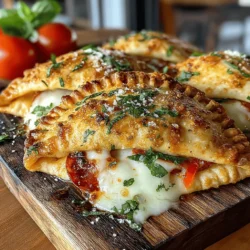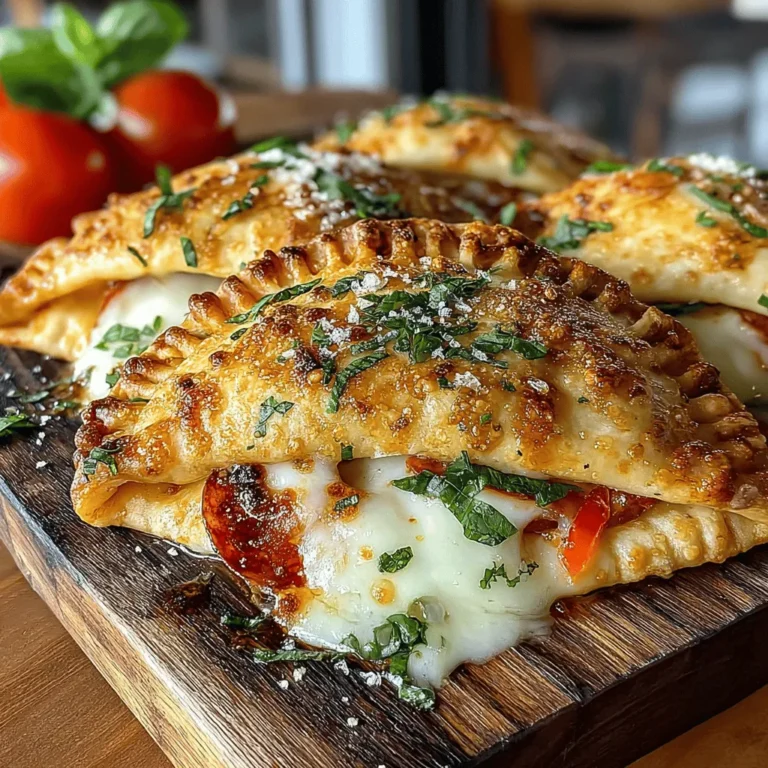Introduction
Pizza is undoubtedly one of the most beloved foods around the globe, celebrated for its delightful combination of flavors and textures. Its versatility allows it to adapt to various tastes and dietary preferences, making it a go-to meal for many. From classic cheese to gourmet toppings, the possibilities are endless. However, traditional pizza can often be heavy and high in calories, which is where Pita Pizza Pockets come into play. These innovative creations offer a healthier, customizable alternative that doesn’t skimp on flavor.
Pita Pizza Pockets are not only delicious but also incredibly convenient, making them an excellent choice for a quick meal or snack. Using whole wheat pita bread as the base elevates this dish, providing a nutritious twist that is both satisfying and wholesome. This recipe is perfect for busy weeknights, after-school snacks, or even as a fun cooking project with kids. The ease of preparation and the ability to tailor toppings to individual preferences make Pita Pizza Pockets a favorite among families and health-conscious eaters alike.
Understanding the Ingredients
Overview of Whole Wheat Pita Bread
Whole wheat pita bread serves as the foundation for our Pita Pizza Pockets. Made from whole grains, this type of pita is not only delicious but also packed with nutrients that contribute to a balanced diet. Whole wheat products retain the bran and germ of the wheat grain, offering a higher fiber content compared to their white flour counterparts.
Fiber plays a crucial role in promoting digestive health, keeping you feeling full for longer, and aiding in blood sugar regulation. By choosing whole wheat pita bread over regular white pita, you are enhancing the nutritional profile of your meal, making it a healthier option without sacrificing taste or satisfaction.
The Role of Marinara Sauce
No pizza is complete without a flavorful sauce, and marinara is a classic choice that pairs perfectly with the whole wheat pita. Marinara sauce can be easily made at home or purchased from the store, offering a convenient option for busy cooks. When selecting a marinara sauce, look for varieties that are low in added sugars and high in tomatoes, which are rich in antioxidants like lycopene.
Homemade marinara allows for customization, giving you the flexibility to adjust spices and flavors to your liking. Whether you prefer a simple garlic-infused sauce or one packed with herbs and spices, marinara contributes not just to the flavor but also to the overall health benefits of the dish. It can increase your vegetable intake and adds a delicious base layer to your Pita Pizza Pockets.
Shredded Mozzarella Cheese: A Staple in Pizza
Shredded mozzarella cheese is a staple ingredient in pizza, providing that gooey, melty texture we all love. Mozzarella is known for its mild flavor and excellent melting properties, making it a perfect choice for our Pita Pizza Pockets. Nutritionally, mozzarella is a good source of calcium and protein, essential for maintaining strong bones and muscles.
When preparing your Pita Pizza Pockets, you can experiment with different cheese varieties. For a tangier flavor, try adding provolone or goat cheese. Alternatively, if you’re looking for a lower-fat option, part-skim mozzarella or vegan cheese alternatives can be used, allowing you to enjoy the creamy texture without the extra calories.
Choosing Your Protein: Pepperoni and Alternatives
One of the joys of making Pita Pizza Pockets is the opportunity to choose your favorite toppings, particularly the protein. Traditional options like pepperoni add a savory, slightly spicy kick; however, there are numerous alternatives available for those looking for healthier choices.
Grilled chicken is a lean protein option that can enhance the flavor while keeping the dish light. Plant-based proteins such as chickpeas or tofu are also excellent alternatives that cater to vegetarian and vegan diets. Additionally, consider adding turkey pepperoni or other lower-fat deli meats for a healthier twist on classic toppings. Each protein option brings its unique flavor and texture, allowing you to create a Pita Pizza Pocket that suits your palate.
Colorful Bell Peppers and Their Benefits
Incorporating vegetables into your Pita Pizza Pockets not only boosts their nutritional value but also enhances their flavor and visual appeal. Colorful bell peppers are a fantastic choice, offering a sweet crunch that complements the other ingredients wonderfully.
Nutritionally, bell peppers are low in calories yet high in vitamins, particularly vitamin C and antioxidants. They also provide fiber, which further contributes to your overall health. Including vegetables in your meals is essential for a balanced diet, and Pita Pizza Pockets make it easy to sneak in those extra servings without compromising on taste.
Optional Additions: Black Olives and Fresh Basil
To elevate your Pita Pizza Pockets even further, consider adding black olives and fresh basil. Black olives introduce a briny flavor that can enhance the overall taste profile of your pizza. They are also a great source of healthy fats and antioxidants, making them a nutritious addition.
Fresh herbs, such as basil, not only add vibrant color but also pack a punch of flavor. The aromatic qualities of fresh basil can transform your Pita Pizza Pockets into a gourmet experience. Plus, herbs are known for their various health benefits, including anti-inflammatory properties, making them a valuable addition to any dish.
Step-by-Step Instructions for Pita Pizza Pockets
Preheating the Oven: Importance of Proper Temperature
Before diving into the preparation of your Pita Pizza Pockets, it’s essential to preheat your oven. A properly heated oven ensures that your pizzas cook evenly and develop a delightful, crispy texture. Aim for a temperature of around 375°F (190°C), which is ideal for baking the pita bread and melting the cheese without burning the toppings. Preheating the oven is a crucial step in achieving the best results for your Pita Pizza Pockets.
Preparing the Pitas: Tips for Cutting and Opening
Once your oven is preheated and ready to go, it’s time to prepare the whole wheat pita bread. Start by carefully cutting each pita in half to create pockets. Gently open each half to form a space for your fillings. If you are using thicker pitas, you may need to slice a little deeper to ensure there’s enough room for the ingredients.
To make it easier to fill the pitas, you can lightly toast them in the oven for a few minutes before adding your toppings. This step helps to create a sturdier base that can hold the fillings without becoming soggy. With your pitas prepared, you’re ready to assemble your delicious Pita Pizza Pockets, setting the stage for a quick and healthy meal that is sure to impress.
Stay tuned for the next part of this article, where we will delve into the assembly process and baking instructions for these delightful Pita Pizza Pockets.
{{image_2}}
Techniques to Ensure Pitas Do Not Tear
When it comes to creating the perfect pita pizza pockets, maintaining the integrity of the pita bread is crucial. Here are some effective techniques to ensure that your pitas remain intact during the stuffing and baking process:
1. Choose Fresh Pitas: Fresh pita bread is more pliable and less likely to tear compared to stale bread. Opt for whole-grain or traditional pitas that are soft and flexible.
2. Warm the Pitas: Gently warming the pitas in a microwave or a dry skillet for a few seconds makes them more pliable. This can prevent tearing when you stuff them.
3. Cut Carefully: When slicing the pita, do it gently to create a pocket without cutting all the way through. A small incision at the top will allow you to open the pocket without compromising its structure.
4. Avoid Overstuffing: This is essential. Overstuffing can lead to tearing. Aim for a moderate amount of filling that allows the pita to close comfortably.
Crafting the Filling: Combining Flavors
Creating a flavorful filling is the heart of your pita pizza pockets. Here is how to combine flavors effectively:
1. Base Sauce: Start with a base sauce like marinara, pesto, or hummus. These add moisture and flavor but should be used sparingly to prevent sogginess.
2. Cheese Selection: Use a combination of cheeses for depth. Mozzarella offers meltiness, while feta can add a tangy kick. Shredded cheese blends can also enhance texture and flavor.
3. Vegetables and Proteins: Incorporate a variety of vegetables and proteins. Bell peppers, onions, mushrooms, and spinach work well, while grilled chicken, turkey, or plant-based proteins can enhance heartiness.
4. Herbs and Spices: Fresh herbs like basil or oregano can elevate the flavor profile. Don’t hesitate to add a pinch of red pepper flakes for a hint of spice or garlic powder for extra aroma.
Importance of Even Mixing for Consistent Taste
Mixing your filling ingredients evenly is essential for a consistent taste throughout the pita pizza pockets. Here are a few tips:
– Use a Mixing Bowl: Combine your ingredients in a bowl, ensuring every component is evenly distributed.
– Taste as You Go: Before filling the pitas, taste the mixture to adjust seasonings and ensure a balanced flavor.
– Layering: When stuffing, layer your ingredients instead of dumping them all at once. This helps to keep flavors evenly spread throughout the pocket.
Suggestions for Ingredient Variations
Pita pizza pockets are incredibly versatile and can be tailored to suit various dietary preferences. Here are some ingredient variations you might consider:
– Meat Lovers: Add pepperoni, sausage, or ham for a heartier option.
– Mediterranean Flavor: Incorporate olives, sun-dried tomatoes, and artichoke hearts for a Mediterranean twist.
– Vegan Delight: Use dairy-free cheese and a mix of roasted vegetables for a filling that’s entirely plant-based.
Stuffing the Pita Pockets: Best Practices
Stuffing the pita pockets correctly enhances both flavor and presentation. Here are some best practices to follow:
1. Spread Sauce First: Spread a thin layer of your chosen sauce inside the pita to help keep the bread moist and flavorful.
2. Layer Ingredients: Start with a protein layer, followed by vegetables, and top with cheese. This layering prevents the ingredients from spilling out.
3. Avoid Overstuffing: Fill each pita lightly; a few tablespoons of filling is generally sufficient. This helps in keeping the pita manageable.
Techniques to Avoid Overstuffing and Ensure Easy Handling
– Use a Spoon: A tablespoon is perfect for portioning out the filling. This helps control how much you are adding at a time.
– Press Gently: After stuffing, gently press down on the pita to help it close while keeping the filling inside.
The Olive Oil Brush: Enhancing Texture and Flavor
Brushing your pita pockets with olive oil before baking not only enhances their flavor but also improves texture. Here’s how:
– Flavor Infusion: Olive oil adds richness and depth to the overall taste of the pita pizza pockets. You may also infuse it with garlic or herbs for added flavor.
– Crispy Texture: The oil helps achieve a golden, crispy exterior, which contrasts beautifully with the soft inside.
Baking to Perfection: Timing and Indicators
Baking your pita pizza pockets correctly is crucial for the best taste and texture. Here are some tips on timing and indicators:
1. Preheating: Always preheat your oven to around 375°F (190°C) before baking. This ensures even cooking right from the start.
2. Baking Time: Bake for about 10-15 minutes. Keep an eye on them; they should be golden brown and the cheese melted.
3. Signs of Readiness: The pita bread should puff up slightly, and you should see the cheese bubbling. A light golden color indicates they are ready to come out.
Garnishing and Serving: Presentation Tips
Presentation can elevate the dining experience. Here are some ideas for plating and serving your pita pizza pockets:
– Garnish Options: Sprinkle fresh herbs like parsley or basil on top for a pop of color. A drizzle of balsamic glaze can also enhance visual appeal.
– Serve with Dips: Pair your pita pockets with dips like tzatziki or extra marinara for added flavor and a fun dipping experience.
– Plating Ideas: Serve them on a wooden board with slices arranged neatly or in a basket lined with parchment paper for a rustic look.
Nutritional Benefits of Pita Pizza Pockets
Pita pizza pockets not only satisfy taste buds but also offer significant nutritional benefits. Here’s a closer look:
Overview of Calorie Counts and Portion Sizes
A typical pita pizza pocket can range from 250-400 calories, depending on the ingredients you use. Adjusting portion sizes can help tailor them to your dietary needs.
Benefits of a Balanced Meal Featuring Whole Grains, Protein, and Vegetables
– Whole Grains: Pita bread is a great source of whole grains, providing fiber that aids digestion and keeps you feeling full.
– Protein: Including proteins such as chicken or beans contributes to muscle health and satiety.
– Vegetables: Adding colorful vegetables increases the meal’s vitamin and mineral content, making it more nutritious.
Comparison to Traditional Pizza in Terms of Health and Nutrition
Compared to traditional pizza, pita pizza pockets are often lower in calories and fat, particularly if you control the amount of cheese and oil used. They also provide a greater proportion of vegetables, making them a healthier choice overall.
Customization Options for Pita Pizza Pockets
Pita pizza pockets are incredibly adaptable, catering to a variety of dietary needs and preferences. Here are some customization options:
Vegetarian and Vegan Variations
For those who prefer plant-based meals, consider using:
– Dairy-Free Cheese: There are many great dairy alternatives available that melt well.
– Hearty Vegetables: Zucchini, artichokes, and roasted peppers can add depth and flavor.
Gluten-Free Options
For gluten-free diets, here are some suggestions:
– Gluten-Free Pita Bread: There are several brands available that offer gluten-free pita options.
– Adjustments: Ensure all other ingredients, including sauces, are gluten-free to maintain the integrity of the meal.
Flavor Profiles: Spicy, Savory, or Sweet
Get creative with flavor profiles by adding:
– Spicy: Incorporate jalapeños or a spicy marinara sauce for heat.
– Savory: Use herbs like rosemary or thyme to enhance the savory notes.
– Sweet: For a unique twist, try adding a drizzle of honey or fig jam paired with goat cheese.
Conclusion
Pita pizza pockets are not just a delicious meal; they’re a healthy and easy-to-make alternative to traditional pizza that can be customized to suit any palate. With their versatility, they appeal to both meat lovers and vegetarians alike, and their nutritional benefits make them a smart choice for family dinners or gatherings.
Encouraging readers to experiment with their own variations can lead to unique creations that reflect personal tastes. So don’t hesitate to dive into this delightful recipe and enjoy a nutritious meal that’s packed with flavor and creativity!


